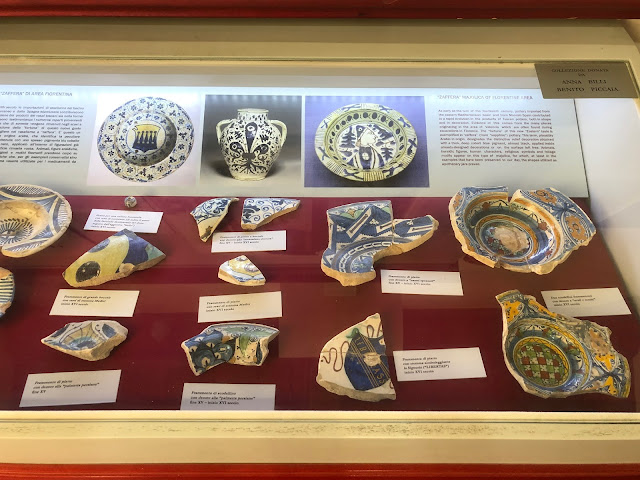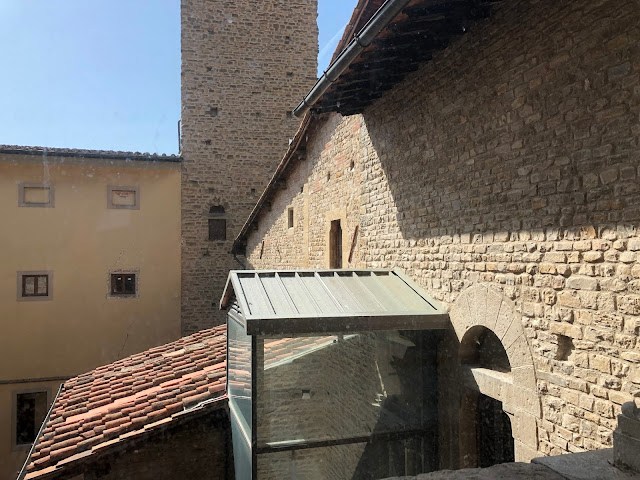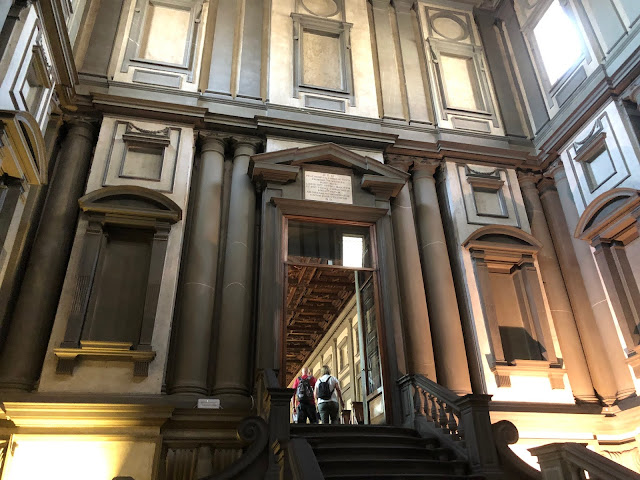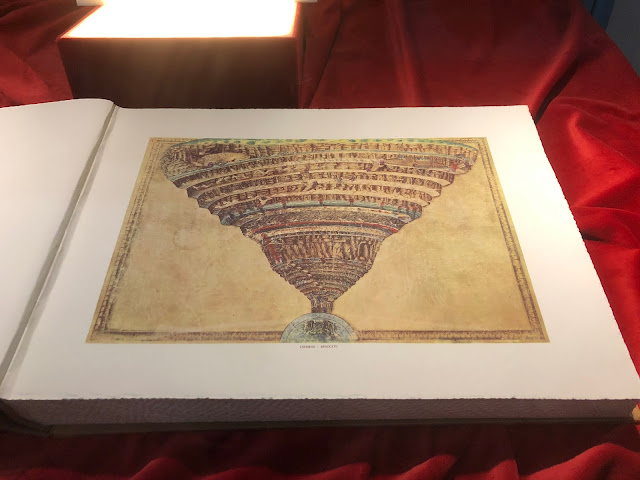【フィレンツェ】ダンテの家 ペトラルカとボッカッチョ Firenze - Casa di Dante, Petrarca & Boccaccio
ダンテの家には、ダンテにまつわる展示の他にも、ダンテが生きていた頃のフィレンツェの様子を紹介する展示コーナーもある。
当時使われていたという陶磁器などの器は、素朴な味わいが残っていて、まだ中世の時代の名残が感じられる。
フィレンツェは、芸術の都と言われ、ブラマンテらの建築作品、ドナテッロやミケランジェロの彫刻作品、そしてボッティチェリやダ・ヴィンチらの絵画などはよく知られている。
文学の世界でも、フィレンツェにはダンテに続いて多くの巨人が現れた。
イタリアを代表する人文学者で詩人のペトラルカは、トスカーナ州のアレッツォに1304年に生まれたが、父親はダンテと同じ白派に属して、やはりフィレンツェから追放された人物だった。
ボローニャ大学などで法学を勉強していたが、やがてラテン文学に興味を持ち始め、キケロをはじめとした古代ローマの文学を学ぶようになっていった。
1341年にはローマで桂冠詩人としての栄誉に服した。
In addition to the exhibits related to Dante, Dante's house also has an exhibition corner that introduces the state of Florence when Dante was alive.
Pottery and other vessels that were used at that time still have a simple taste, and you can still feel the remnants of the Middle Ages.
Florence is said to be the city of art, and the architectural works of Bramante and others, the sculptures of Donatello and Michelangelo, and the paintings of Botticelli and Da Vinci are well known.
Even in the world of literature, many giants appeared in Florence after Dante.
Petrarca, one of Italy's leading humanists and poet, was born in Arezzo, Tuscany in 1304, but his father belonged to the same White faction as Dante and was also exiled from Florence.
He was studying law at the University of Bologna, but soon became interested in Latin literature and began to study ancient Roman literature, including Kikero.
He was honored as a poet laureate in Rome in 1341.
ダンテの『神曲』を高く評価したボッカッチョは、フィレンツェの商人を父として1313年に生まれた。
幼い頃からダンテの作品に親しんでいたようだ。
1348年にフィレンツェではペストが大流行した。ボッカッチョは、そのペストから逃れた男女10人が、それぞれ10の話をするという『デカメロン』を書いた。
最初の章では、ペストに襲われたフィレンツェの痛ましい様子が描かれるが、その後はエロチックな恋愛話や、たわいもない噂話などが語られる。
100の話から構成される点は、明らかに『神曲』に対するオマージュだろう。
ダンテやペトラルカの、詩を中心とした文学ではない、散文による新しい時代の文学を生み出して、チョーサーの『カンタベリー物語』などに影響を与えた。
ペストという伝染病をテーマとしたその物語は、新コロナ・ウィルスに苦しむ現代においても新たな注目を集めている。
同時代に生きたペトラルカとは深い親交があり、往復書簡なども残されている。
その後、フィレンツェを支配したメディチ家のロレンツォも”命短しこいせよ乙女”などのソネットを作り、プラトン・アカデミーで古代文学を研究させた。
プラトン・アカデミーに出入りしていたミケランジェロも、その影響からかソネットを作っている。
『君主論』を書いたマキャベッリも、マンドラゴラという喜劇の戯曲を書いている。
フィレンツェを追放されたダンテによって始められた文学の冒険が、やがてフィレンツェがイタリア文学を主導していくことになるとは、歴史の皮肉のように感じられてならない。
Boccaccio, who highly valued Dante's Divine Comedy, was born in 1313 to a Florentine merchant as his father.
He seems to have been familiar with Dante's work from an early age.
The plague was a pandemic in Florence in 1348. Boccaccio wrote The Decameron, in which 10 men and women who escaped the plague talk 10 stories each.
The first chapter depicts the painful appearance of Florence being attacked by the plague, followed by erotic love stories and dull rumors.
The point composed of 100 stories is clearly a homage to "La Divina Commedia".
He created a new era of prose literature, not poetry-centered literature, by Dante and Petralka, and influenced Chaucer's The Canterbury Tales.
The story about the plague, an infectious disease, is drawing new attention even today, when it suffers from the new coronavirus.
He has a close friendship with Petralka, who lived at the same time, and has left a round-trip letter.
Later, the Medici Lorenzo, who ruled Florence, also created sonnets such as "Short-lived Maiden" and had them study ancient literature at the Platonic Academy.
Michelangelo, who was in and out of the Platonic Academy, is also making a sonet because of that influence.
Machiavelli, who wrote The Prince, also wrote a comedy drama called The Mandrake.
It must not feel the irony of history that the literary adventure initiated by Dante, who was exiled from Florence, will eventually lead Florence in Italian literature.
(Translated by Google Translate)




コメント
コメントを投稿